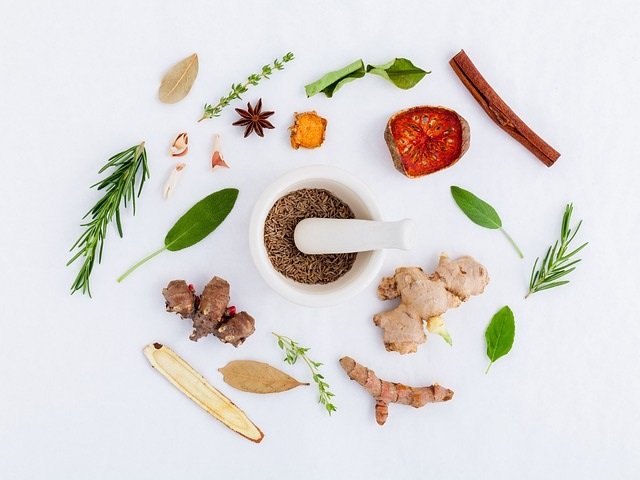
Organic herbs have been used for centuries to treat a variety of ailments and promote overall well-being. Growing your own medicinal herbs allows you to harness the natural healing properties of plants while ensuring they are free from harmful chemicals. Here’s a comprehensive guide for North American readers on the medicinal uses of some popular organic herbs.
1. Basil (Ocimum basilicum)
Medicinal Uses:
- Anti-Inflammatory: Basil contains eugenol, which has anti-inflammatory properties that can help reduce swelling and pain.
- Digestive Aid: Basil tea can aid digestion and relieve gas and bloating.
- Stress Relief: The aroma of basil can help alleviate stress and anxiety.
How to Use:
- Tea: Steep fresh or dried basil leaves in hot water for 5-10 minutes.
- Essential Oil: Add a few drops of basil essential oil to a diffuser or a warm bath.
2. Mint (Mentha spp.)
Medicinal Uses:
- Digestive Health: Mint tea is well-known for relieving indigestion, gas, and bloating.
- Respiratory Relief: The menthol in mint can help clear congestion and soothe the throat.
- Headache Relief: Applying diluted mint oil to the temples can alleviate headaches.
How to Use:
- Tea: Steep fresh or dried mint leaves in hot water for 5-10 minutes.
- Essential Oil: Dilute mint essential oil with a carrier oil and apply to the temples or chest.
3. Rosemary (Rosmarinus officinalis)
Medicinal Uses:
- Memory and Concentration: Rosemary has been shown to improve memory and cognitive function.
- Anti-Inflammatory: It contains rosmarinic acid, which has anti-inflammatory properties.
- Pain Relief: Rosemary oil can help relieve muscle pain and arthritis symptoms.
How to Use:
- Tea: Steep fresh or dried rosemary leaves in hot water for 10-15 minutes.
- Essential Oil: Dilute rosemary essential oil with a carrier oil and massage into sore muscles.
4. Thyme (Thymus vulgaris)
Medicinal Uses:
- Antimicrobial: Thyme has powerful antimicrobial properties, making it effective against infections.
- Respiratory Health: Thyme tea can help relieve coughs and bronchitis symptoms.
- Digestive Aid: Thyme can aid digestion and relieve stomach cramps.
How to Use:
- Tea: Steep fresh or dried thyme leaves in hot water for 5-10 minutes.
- Essential Oil: Add a few drops of thyme essential oil to a steam inhaler or diffuser.
5. Parsley (Petroselinum crispum)
Medicinal Uses:
- Diuretic: Parsley helps increase urine production, aiding in detoxification and reducing bloating.
- Anti-Inflammatory: It contains compounds that can reduce inflammation and support joint health.
- Antioxidant: Parsley is rich in antioxidants, which can help protect cells from damage.
How to Use:
- Tea: Steep fresh or dried parsley leaves in hot water for 5-10 minutes.
- Juice: Add fresh parsley to smoothies or juices for a nutrient boost.
6. Oregano (Origanum vulgare)
Medicinal Uses:
- Antibacterial: Oregano has strong antibacterial properties that can help fight infections.
- Anti-Inflammatory: It contains compounds that reduce inflammation and pain.
- Digestive Health: Oregano can aid digestion and relieve bloating and gas.
How to Use:
- Tea: Steep fresh or dried oregano leaves in hot water for 5-10 minutes.
- Essential Oil: Dilute oregano essential oil with a carrier oil and apply to the skin to treat infections.
7. Chives (Allium schoenoprasum)
Medicinal Uses:
- Cardiovascular Health: Chives are rich in antioxidants and can help lower blood pressure.
- Digestive Health: They can aid digestion and stimulate appetite.
- Immune Support: Chives have antibacterial and antiviral properties that support immune health.
How to Use:
- Fresh: Add fresh chives to salads, soups, and other dishes.
- Tea: Steep fresh or dried chive leaves in hot water for 5-10 minutes.
8. Lavender (Lavandula spp.)
Medicinal Uses:
- Stress Relief: Lavender is well-known for its calming and stress-relieving properties.
- Sleep Aid: Lavender tea or essential oil can help improve sleep quality.
- Skin Health: Lavender oil can soothe irritated skin and promote healing.
How to Use:
- Tea: Steep fresh or dried lavender flowers in hot water for 5-10 minutes.
- Essential Oil: Add a few drops of lavender essential oil to a diffuser or a warm bath.
9. Calendula (Calendula officinalis)
Medicinal Uses:
- Wound Healing: Calendula is effective in promoting wound healing and reducing inflammation.
- Skin Health: It can be used to treat various skin conditions, such as eczema and dermatitis.
- Anti-Inflammatory: Calendula has anti-inflammatory properties that can help reduce pain and swelling.
How to Use:
- Tea: Steep fresh or dried calendula flowers in hot water for 5-10 minutes.
- Topical: Use calendula-infused oil or cream on the skin to promote healing.
Incorporating organic herbs into your garden allows you to harness the natural healing properties of plants. By growing and using these medicinal herbs, you can support your health and well-being in a sustainable and chemical-free way. Remember to consult with a healthcare professional before using herbs for medicinal purposes, especially if you are pregnant, nursing, or taking medication. Embrace the benefits of organic herb gardening and enjoy the natural remedies that nature provides. Happy gardening!
